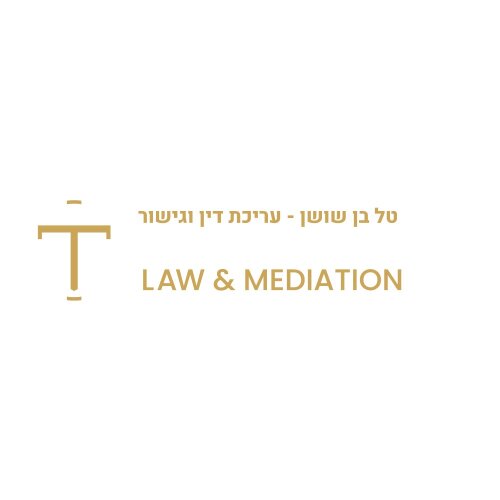Best Restructuring & Insolvency Lawyers in Rishon LeZiyyon
Share your needs with us, get contacted by law firms.
Free. Takes 2 min.
List of the best lawyers in Rishon LeZiyyon, Israel
About Restructuring & Insolvency Law in Rishon LeZiyyon, Israel
Restructuring and insolvency law focuses on the legal processes available to individuals and businesses facing financial distress or insolvency. In Rishon LeZiyyon, as elsewhere in Israel, these laws provide frameworks for managing debts, negotiating with creditors, and potentially starting anew. Israeli law, including recent reforms, seeks to balance the interests of the debtor with those of the creditors while encouraging fair and orderly procedures for resolving financial difficulties. If you are a resident or business owner in Rishon LeZiyyon, understanding these laws and your options is crucial for protecting your assets and future.
Why You May Need a Lawyer
Legal assistance is often necessary in restructuring and insolvency matters due to the complexity and potential implications involved. Common situations where residents or businesses in Rishon LeZiyyon might need a lawyer include:
- Struggling to pay back loans or meet financial obligations
- Receiving legal notice from creditors or collection agencies
- Facing potential bankruptcy proceedings
- Wishing to negotiate reduced payments or new terms with creditors
- Involving multiple creditors with competing claims
- Needing legal representation in court or in negotiations
- Seeking to protect assets from seizure or liquidation
- Directors or managers of companies needing advice on personal liability
- Wish to restructure your business for future viability
An experienced restructuring and insolvency lawyer can help assess your specific circumstances, explain your rights and obligations, and represent your interests in negotiations or court proceedings.
Local Laws Overview
Israeli insolvency law is governed primarily by the Insolvency and Economic Rehabilitation Law, 5778-2018, which introduced significant reforms to modernize and unify insolvency procedures for individuals and corporations. Key points relevant to Rishon LeZiyyon include:
- Both individuals and businesses can initiate insolvency proceedings, either voluntarily or by creditor application
- There is an emphasis on rehabilitation over liquidation where possible
- Automatic stay orders can protect debtors from creditor actions during certain proceedings
- Trustees or administrators may be appointed to oversee the process
- Detailed disclosure of assets, liabilities, and financial transactions is required
- The courts in Rishon LeZiyyon follow national laws but may have specific local procedures or judicial practices
- Directors and managers have duties to avoid deepening insolvency and may face personal liability in case of misconduct
- Approved debt arrangements can help debtors regain solvency and eventually receive a discharge from remaining debts
Because the process and consequences can differ based on individual situations, it is important to seek tailored legal advice.
Frequently Asked Questions
What is the difference between restructuring and insolvency?
Restructuring refers to reorganizing a company or individual's debts and operations to avoid insolvency or improve financial health. Insolvency is the situation where a debtor cannot meet their financial obligations as they become due.
Can individuals file for insolvency in Rishon LeZiyyon, or is it only for businesses?
Both individuals and businesses can file for insolvency under Israeli law. The process and criteria may differ, but legal protections are available to both types of debtors.
What happens once I file for insolvency?
Filing for insolvency typically initiates a court-supervised process, including possible suspension of creditor actions, appointment of a trustee, and preparation of a repayment or liquidation plan.
Am I protected from creditors after filing for insolvency?
Generally, an automatic stay is issued which temporarily prevents creditors from taking further action, such as seizing assets or commencing lawsuits, while the insolvency process is underway.
Can I keep my home or other assets?
Some essential assets may be protected, but others could be sold to repay creditors depending on your circumstances and the nature of your debts. An attorney can clarify what may be exempt in your case.
How long does the insolvency process take in Rishon LeZiyyon?
The duration varies according to the debtor's situation, complexity of the case, and court schedules. It can range from several months to a few years in complex matters.
Will insolvency affect my credit score or future borrowing ability?
Yes, an insolvency can negatively impact your credit rating, and records may remain on file for several years, affecting your ability to obtain loans or credit in the future.
Is it possible to negotiate with creditors instead of going through insolvency?
Yes, debt restructuring or out-of-court settlements may allow you to reach new agreements with creditors without formal insolvency. Legal counsel can help with negotiations and ensure your interests are protected.
What are the legal responsibilities of company directors during insolvency?
Directors must act in good faith and take reasonable steps to minimize losses for creditors. Failing to uphold these duties may expose them to personal liability.
Do I need to hire a lawyer for insolvency or restructuring in Rishon LeZiyyon?
While not always legally required, it is strongly recommended due to the complexity of procedures, potential risks, and need for effective negotiation and representation.
Additional Resources
For further guidance and support, consider contacting the following resources:
- The Israel Ministry of Justice - Insolvency and Economic Rehabilitation Service
- The Official Receiver's Office (local branch in Rishon LeZiyyon or nearby district)
- The Israeli Bar Association’s legal aid clinics
- Consumer protection bureaus or financial counseling organizations
- Chamber of Commerce in Rishon LeZiyyon for business-specific advice
These organizations can provide information, referrals, and sometimes initial consultations regarding your circumstances.
Next Steps
If you are considering or facing restructuring or insolvency in Rishon LeZiyyon, it is important to act promptly. Here are suggested steps:
- Gather all relevant financial documentation, including debts, assets, and income details
- Assess the urgency of your situation, especially if legal proceedings have started
- Contact a reputable lawyer who specializes in restructuring and insolvency in your area
- Prepare to discuss your circumstances openly and honestly with your legal counsel
- Follow your lawyer’s advice regarding negotiations, court appearances, or documentation requirements
Taking early action with the right legal support increases your chances of a favorable outcome and can help ease the stress of financial hardship.
Lawzana helps you find the best lawyers and law firms in Rishon LeZiyyon through a curated and pre-screened list of qualified legal professionals. Our platform offers rankings and detailed profiles of attorneys and law firms, allowing you to compare based on practice areas, including Restructuring & Insolvency, experience, and client feedback.
Each profile includes a description of the firm's areas of practice, client reviews, team members and partners, year of establishment, spoken languages, office locations, contact information, social media presence, and any published articles or resources. Most firms on our platform speak English and are experienced in both local and international legal matters.
Get a quote from top-rated law firms in Rishon LeZiyyon, Israel — quickly, securely, and without unnecessary hassle.
Disclaimer:
The information provided on this page is for general informational purposes only and does not constitute legal advice. While we strive to ensure the accuracy and relevance of the content, legal information may change over time, and interpretations of the law can vary. You should always consult with a qualified legal professional for advice specific to your situation.
We disclaim all liability for actions taken or not taken based on the content of this page. If you believe any information is incorrect or outdated, please contact us, and we will review and update it where appropriate.










